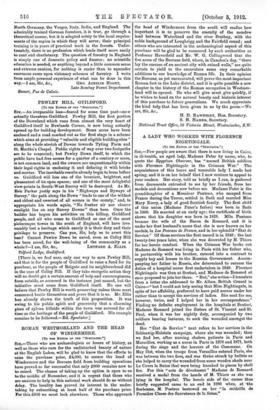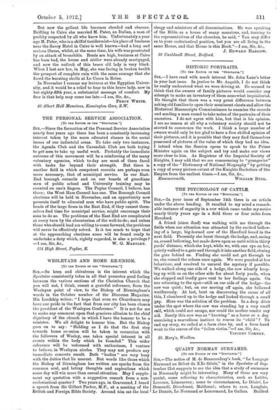A LADY WHO WORKED WITH FLORENCE NIGHTINGALE.
[To THE EDITOR OF THE " SPECTATOR."] Sin,—Few people are aware that there is now living in Cairo, in ill-health, an aged lady, Madame Pater by name, who, to quote the Egyptian Observer, has " nursed British soldiers with Florence Nightingale in the Crimean War." The acquaintance of this brave and venerable lady I made last spring, and it is on her behalf that I now venture to appeal to your readers. Her story, told as briefly as I can, is gathered from documents entrusted to me by her friends, from her medals and decorations now before me. Madame Pater is the granddaughter of a Monsieur Panteau, who escaped from France during the Terror, settled in Bath and married Miss Mary Norry, a lady of good Scottish family. The first child of this union (Madame Pater's father) was born in Bath in 1800. He married at an early age; the certificate of birth shows that his daughter was born in 1828. Mlle. Panteau became the wife of the Baron de Ronsard, and it is under her first husband's name that she is now known on her medals, in Les Femmes de France, and in her splendid "Etat de Service." Of these services the first record is in 1849 ; the last twenty-two years later, when she was decorated by M. Thiers for her heroic conduct. When the Crimean War broke out Madame de Ronsard was living in Paris with her father who, in partnership with his brother, entered into a contract to supply hay and horses to the Russian Government. Accom- panying her father to Russia, she determined to resume the duties of a hospital nurse first undertaken in 1849. Florence Nightingale was then at Scutari, and Madame de Ronsard at once proposed to join her there. " But," she writes—I translate from a letter she addressed to Mr. Alban, British Consul in Cairo—" but I could not help seeing that Miss Nightingale, in spite of her affability, preferred to have paid nurses under her rather than to accept the services of ladies. She sent for me, however, twice, and I helped her in her correspondence." Finding no definite employment in the hospitals at Scutari, Madame Ronsard joined the Sisters of St. -Vincent and St. Paul, when it was her nightly duty, accompanied by two soldiers bearing lanterns, to seek the wounded amongst the dead.
Her "Etat de Service" next refers to her services in the Schleswig-Holstein campaign, where she was wounded ; then we find her, after nursing cholera patients in Paris and Marseilles, working as a nurse in Paris in 1870 and 1871, both during the siege and the horrors of the Commune. On May 21st, when the troops from Versailles entered Paris, she was between the two fires, and was thrice struck by bullets as she helped to carry the wounded from some wooden sheds near Le Corms la Reine that were being knocked to pieces by shell fire. For this " acts de devoiiment " Madame de Ronsard received a medal from the hands of H. Thiers as she was lying in the hospital. The heroic side of the career thus briefly suggested came to an end in 1886 when, at the Sorbonne, IL Pasteur bestowed on her " la medallic de Premiere Clam des Sauveteurs de la Seine."
But now the gallant life becomes clouded and obscure. Drifting to Cairo she married M. Pater, an Italian, a man of probity respected by all wbo knew him. Unfortunately a year ago M. Pater, who is a skilful taxidermist—his place of business near the Savoy Hotel in Cairo is well known—had a long and serious illness, whilst, at the same time, his wife was prostrated by an attack of bronchitis. Rents are high, business at Cairo has been bad, the house and atelier were already mortgaged, and now the outlook of this brave old lady is very black. When I last saw her, in May, she was facing in broken health the prospect of complete ruin with the same courage that she faced the bursting shells at Le Cours la Reine.
In November I resume my lectures at the Egyptian Univer- sity, and it would be a relief to bear to this brave lady, now in her eighty-fifth year, a substantial message of comfort. My fear is that help may come too late.—I am, Sir, &c.,
PERCY WHITE.
40 Albert Hall Mansions, Kensington Gore, S.W.



































































 Previous page
Previous page